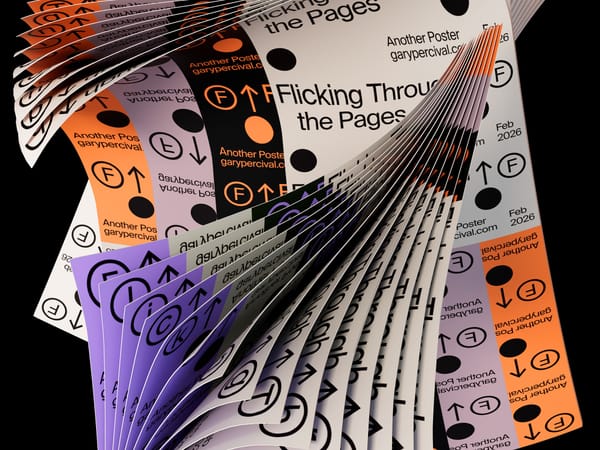Ignoring the Critics and Embracing Selfish Creativity
Are you a creative who has ever been afraid to put their ideas out into the world?

Are you a creative who has ever been afraid to put their ideas out into the world?
Do you feel discouraged whenever someone judges or critiques your work? You're not alone. Many of us worry that our work, whether it be graphic design, illustration, artwork, or even writing and blogging, won't be seen as good enough.
What if I told you that there is another way to approach this—one where instead of being controlled by other people's opinions about our designs, we instead embrace what makes us unique and use selfish creativity as an empowering tool?
In this post, I'm going to help you understand how choosing to ignore the critics can lead to more fulfilling projects and impactful outcomes for your creative career!
Why it's important to ignore the critics and focus on your own creativity
Everyone has critics in life, and some opinions are better left unheard.
It can be incredibly demoralising to have someone openly criticise your creativity, particularly when it's something you've worked hard at. That is why it is important to ignore the naysayers and instead focus on yourself and your own desires without the interference of what other people may think or feel. These critical opinion-holders can create a discouraging environment when all you want to do is express yourself freely and pave your own creative path.
Instead, develop resilience and self-confidence while fuelling yourself with creative inspiration, so that you will continue to grow strong and keep believing in what you do no matter how many critics come along the way.

How to embrace selfish creativity: put yourself first and don't worry about what others think.
Being truly creative means taking the time to put yourself first.
It’s often too easy to be hard on ourselves and anxious about others’ opinions, so much so that we can forget that creativity is at its best when it’s a solo endeavour: something between you, your ideas, and your tools of expression. Making an effort to carve out a space of solitude to work on self-directed projects allows us to explore our most selfish creative impulses without worrying about the influence or judgement of those around us.
Once we get in touch with these natural inclinations, our authentic creative voice can find freedom from fear, leading to inspired works of art and joyous personal fulfilment!

How to ignore the critics and stay focused on your goals
It is easy to become discouraged by criticism, whether it is from your peers, an employer, or even a stranger.
However, it is important to remember that criticism does not define you as a person or your worth as a creative. The most important thing to do when faced with criticism is to take a step back, evaluate the feedback objectively, and make an informed decision about how you want to move forward. It can be helpful to ask yourself questions such as: "Is this feedback valid?" Does it align with my goals? How can I use this information to better my work?
It is also important to remember that criticism doesn't have to be taken personally. You can use it as a lesson and make adjustments accordingly, rather than letting it get you down or stopping your progress altogether.
Keep in mind that it is easy to be discouraged by criticism, but with the right mindset and attitude, you can ignore the critics and stay focused on your goals no matter what the circumstance.

Finding the Right Balance Between Selfishness and Collaboration
In today's world, finding the right balance between selfishness and collaboration is important.
Although these two characteristics appear to be incompatible, they are not. On the contrary, it is possible to have both of these characteristics in a balanced way.
Selfishness can be a beneficial trait in life because it allows us to take care of ourselves and prioritise our own needs. It also teaches us to value ourselves and invest in our own happiness. The key is to recognise when we have taken care of ourselves sufficiently so that we do not neglect those around us.
Choosing when to be selfish allows us to stay motivated without jeopardising our relationships with others.
Collaboration, on the other hand, entails collaborating with another person or group of people to achieve a common goal.
It promotes creativity, problem-solving abilities, and cooperation among participants. Individuals can benefit from shared knowledge and resources that would otherwise be inaccessible if they rely on one another during difficult tasks. Collaboration, when used correctly, can lead to greater success than any individual could achieve alone.
Finding the right balance between selfishness and collaboration is critical for achieving one's goals while maintaining healthy relationships with others.
To achieve such a balance, you must establish boundaries between yourself and others so that you are not overwhelmed by their needs or demands while remaining open to mutually beneficial interactions when appropriate.
Above all, it necessitates genuine consideration for both your own desires and those of those around you, so that no one feels overlooked or exploited in the process.

The benefits of ignoring the critics, including increased confidence and improved creative output
It isn't always easy to ignore criticism, especially when it's negative.
But focusing on the criticism too much can have a crippling effect on our confidence. Instead of worrying about what others think, you should take a moment to focus on just yourself. We are all capable of achieving great things when we put our minds to them.
When we realise that the opinions of the critics don't define us and instead trust in ourselves, it opens up a newfound sense of creativity.
This newfound freedom allows us to perform better than ever before and make great strides towards achieving our goals.
So, the next time criticism makes you feel down, remind yourself that you are capable. Ignore the bad things people say and be inspired by what you can do.

Sharing your work with others: the pros and cons
Sharing your work with others can be a great way to gain feedback and recognition, but it can also open you up to criticism and scrutiny.
The pros of sharing your work include getting valuable feedback, having an opportunity to showcase your skills or create awareness, and building credibility and trust. On the other hand, the cons include the feeling of vulnerability, being criticised or judged harshly, and potential loss of privacy.
Ultimately, the decision to share your work is up to you. Weigh the pros and cons carefully before making a choice. Researching what other people with similar goals have done can also help inform your choice. If you decide to go ahead with sharing your work, make sure to be prepared for both positive and negative reactions.
Know that you can always take constructive criticism in stride and remember that it's ok to take a step back if the experience isn't what you expected.
At the end of the day, only you know what is best for your work and career goals, so trust your gut and go with what works for you.
Taking some time off from sharing
You don't have to share everything you make all the time; taking a break from the spotlight can be beneficial for both inspiration and productivity.
You will have more opportunities to explore different creative paths without worrying about what others think of your work if you do this. You won't have to worry about being judged too harshly or feeling pressed to get something out there quickly.
This also allows you to learn from your mistakes without feeling as if everyone is watching.
Making mistakes is an important part of learning, so rather than being too hard on yourself for not getting something perfect on the first try, embrace them and use them as an opportunity to improve.

Why it's important to be selfish with your time and energy
Being overly generous with your time and energy can leave you feeling depleted and overwhelmed, which can have negative consequences for both your physical and mental well-being.
When it comes to being selfish with time and energy, it’s important to understand what is necessary for us to achieve our goals and find balance in our lives.
Taking time for ourselves allows us to recharge so that we can face the day’s tasks with renewed enthusiasm. It also allows us to stay focused and productive in whatever we do. This means carving out time for activities such as exercise, reading, taking part in hobbies, or simply having conversations with friends and family.
These moments help us clear our minds, relax, and re-energise ourselves.
We should also be mindful of how much energy we give away to others—whether it be emotional or physical. There are times when it’s important to give of ourselves to help those around us; however, this should always be done from a place of self-care rather than obligation or pressure from others.
Helping someone else without putting our own needs first can lead to burnout if not managed carefully.
Finally, it should be noted that being selfish with time and energy doesn't mean becoming self-centred or uncaring towards other people's needs; rather, it means exercising discretion when making decisions about how we spend these precious resources so that they are used wisely.
Everyone has different priorities when it comes to their time and energy, so it’s important that each person takes responsibility for their own well-being by learning how best to use these finite commodities in order to reach their highest potential.

Start embracing your own selfish creativity today!
Have you ever wished for the freedom to make decisions about your life, career, family, and future without having to worry about what other people think of you?
Embracing your own selfish creativity means allowing yourself to pursue the things that are most important to you—even if they don't make sense within the context of society. It entails focusing on what brings you joy and inner peace, as well as pushing boundaries in both traditional and unconventional ways. But it's not easy—recognising what you want can be difficult because it requires confronting your biggest fears and accepting responsibility for where you are now.
However, beginning today is essential: take small steps towards self-awareness and exploration, surround yourself with positive influence, be brave, and trust your inner voice.
And remember: there is no limit to how much better your life can become when you commit to using creative outlets to express your true feelings, dreams, visions, and arguments.
At its heart, creativity is a form of self-expression that should be valued and nurtured.
Don’t let negative criticism cloud your judgement and prevent you from following your creative passion. Take the time to explore new ideas, learn from mistakes, and take constructive feedback with an open mind. By actively embracing selfish creativity, you can gain confidence in yourself and your creative process.
Creativity isn’t something to be scared of or inhibited; it should be welcomed as a means of discovering and expressing who you are. Selfishness doesn’t have to mean being narrow-minded or obstinate; instead, it can equip you with the skill and bravery to create something truly unique and meaningful. Letting go of fear can be frightening, but the rewards, in the end, will be worth it.
Creative expression is ultimately about courageously claiming ownership of your work—so don’t let anyone else tell you what to make or do—unleash your own potential instead!



